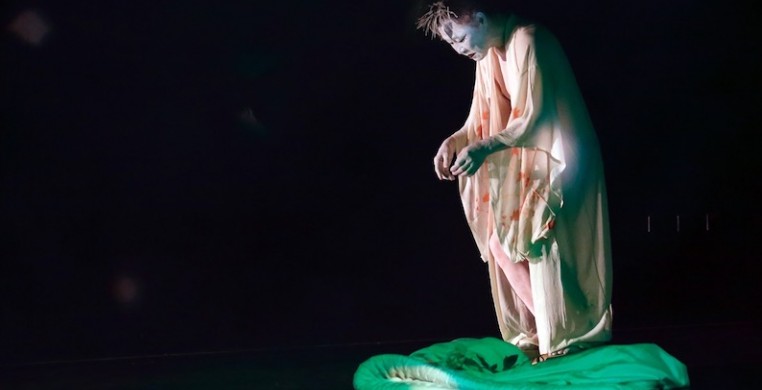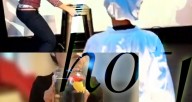Sara Zalek moved to Chicago in 2004, but the first time I remember seeing her perform was in 2014. She was swaddled in Saran wrap, laying horizontally, like a wake, atop a vinyl air mattress. We all patiently waited for her platform to inflate, then Zalek danced a topsy-turvy, hilarious balance exercise as she rose to her feet on that airbed. I came across her more recently in 2017, lurking on the Chicago Cultural Center’s main staircase, wrapped in bubble wrap at the inaugural Elevate Chicago Dance.
Zalek’s works, and those of other artists who are part of the thriving Butoh movement in Chicago, don’t always have the hallmarks of a stereotypical Butoh performance – molasses slow movements, grotesque facial expressions and chickens might come to mind – but make no mistake, this is Butoh.
Or at least, Zalek is heavily influenced by the artform which began as a rebellion against the westernization and dilution of Japanese culture after World War II. Butoh quickly spread from Japan to influence performers all over the world, and it was here in Chicago Zalek first learned about the discipline.
“In 2010, I started bringing Butoh artists [to Chicago], and given my marketing background, decided to create a website and Facebook presence where it was easier to find resources. It had been nearly impossible before,” wrote Zalek in an e-mail while working abroad in Japan.
Zalek’s performance on that air mattress was part of the first Butoh festival in Chicago, aimed at bringing awareness to the form by inviting practicing local, national, and international Butoh artists to share their work with each other and the public. Now in its fifth year, this year’s festival – or “non-festival,” as Zalek calls it – includes two intensive workshops and performances scattered throughout May.
Kicking off the festival, a workshop with Berlin-based Yuko Kaseki begins tomorrow. Participants can opt in for a day, or the whole four-day experience, which consists of 14 hours of intensive practice inspired by Yuko’s teachings in Noguchi Taiso (Gymnastics), Tai-Chi Dao-yin and Butoh. Yuko is also slated to perform May 3 at No Nation Gallery in Wicker Park.
May 25-31, Tadashi Endo makes his third visit to Chicago, leading workshops at OuterSpace Studios which conclude in a performance by participants. As a pupil of Butoh master Kazuo Ohno, part of the intensive includes insight about foundational figures in the field, complemented by an invitation to define Butoh for oneself.
“Both Yuko and Tadashi Endo are bringing their teaching as the primary purpose of arriving,” said Zalek. “This is the real gift to the Chicago art scene. Artists that attend these workshops have a real opportunity to find something new, both inside themselves and in the way they share their performance with their audience.”
Zalek admits Butoh can be challenging to define, and that’s part of the point. It’s a discipline which combines elements of dance, theater and performance art, rigorous in practice but largely free from attachment to rules. No two artists approach their work in the same way, though there are some trends which are noticeable among Butoh-inspired artists in Chicago.
“I feel the Chicago scene brings real experimental and queer perspective to the Butoh scene, including an interesting combination of sound, music, performance art, physical theater and dance. It really offers a diverse intersection of these practices. Both Yuko and Endo bring a different kind of grit to Chicago, having both expatriated from Japan. It gives them a sense of freedom in their own work–that counter-revolutionary kind of spirit. They are truly individuals that have forged new paths in the practice, and followed their own paths, creating their own versions of the form.”
On May 10, performances by Zalek, Jon Poindexter and Holly Chernobyl at the International Museum of Surgical Science anchor the festival for audience members curious about Butoh, though all levels of experience are encouraged to participate in workshops, too.
“Butoh brings a sense of finding something unique from deep inside each individual, not in beauty but based on real human experience, to share with audience,” said Zalek. “To me, Butoh offers a deepening sense of familiarity with human existence.”
--
The Butoh non-Festival 2019 takes place May 1-31 at various venues. Click on the event pages below for dates, times, and cost, or visit butohchicago.com.


